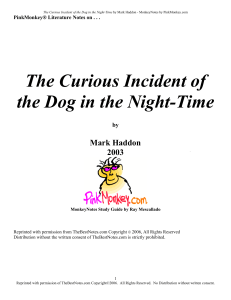HERE - Santa Ana Unified School District
advertisement
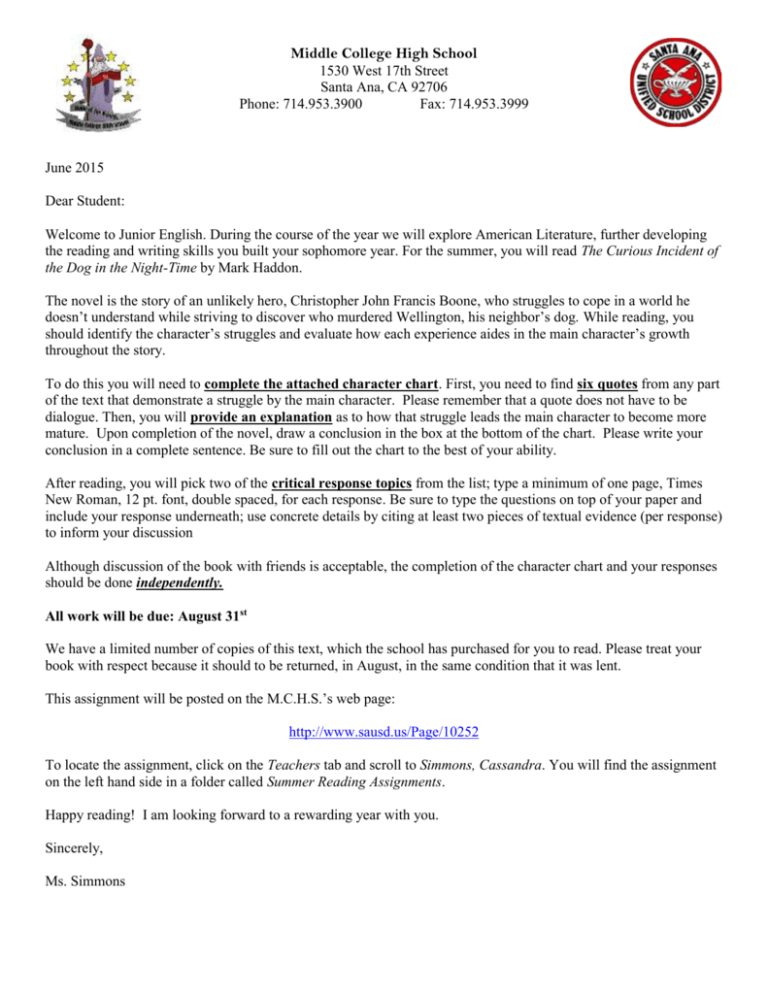
Middle College High School 1530 West 17th Street Santa Ana, CA 92706 Phone: 714.953.3900 Fax: 714.953.3999 June 2015 Dear Student: Welcome to Junior English. During the course of the year we will explore American Literature, further developing the reading and writing skills you built your sophomore year. For the summer, you will read The Curious Incident of the Dog in the Night-Time by Mark Haddon. The novel is the story of an unlikely hero, Christopher John Francis Boone, who struggles to cope in a world he doesn’t understand while striving to discover who murdered Wellington, his neighbor’s dog. While reading, you should identify the character’s struggles and evaluate how each experience aides in the main character’s growth throughout the story. To do this you will need to complete the attached character chart. First, you need to find six quotes from any part of the text that demonstrate a struggle by the main character. Please remember that a quote does not have to be dialogue. Then, you will provide an explanation as to how that struggle leads the main character to become more mature. Upon completion of the novel, draw a conclusion in the box at the bottom of the chart. Please write your conclusion in a complete sentence. Be sure to fill out the chart to the best of your ability. After reading, you will pick two of the critical response topics from the list; type a minimum of one page, Times New Roman, 12 pt. font, double spaced, for each response. Be sure to type the questions on top of your paper and include your response underneath; use concrete details by citing at least two pieces of textual evidence (per response) to inform your discussion Although discussion of the book with friends is acceptable, the completion of the character chart and your responses should be done independently. All work will be due: August 31st We have a limited number of copies of this text, which the school has purchased for you to read. Please treat your book with respect because it should to be returned, in August, in the same condition that it was lent. This assignment will be posted on the M.C.H.S.’s web page: http://www.sausd.us/Page/10252 To locate the assignment, click on the Teachers tab and scroll to Simmons, Cassandra. You will find the assignment on the left hand side in a folder called Summer Reading Assignments. Happy reading! I am looking forward to a rewarding year with you. Sincerely, Ms. Simmons Name: ___________________________________ Per ______ The Curious Incident of the Dog in the Night-Time by Mark Haddon Summer Reading Character Chart Find 2 quotes from each part of the novel Beginning Pgs 1 - 74 Middle Pgs 75 -144 End Pgs 145 - 221 Quote That Demonstrates A Struggle For the Main Character include page # Explain How The Experience Aids In The Main Character’s Growth 1) 1) 2) 2) 1) 1) 2) 2) 1) 1) 2) 2) Conclusion: What do you think the reader is supposed to learn from the main character’s struggles and his/her own emotional growth? __________________________________________________________________________________________ __________________________________________________________________________________________ __________________________________________________________________________________________ __________________________________________________________________________________________ __________________________________________________________________________________________ __________________________________________________________________________________________ Critical Reading Responses: Pick 2 topics from the list; type a minimum of one page for each response/double spaced. Be sure to type the questions on top of your paper and include your response underneath; use concrete details by citing at least two pieces of textual evidence (per response) to inform your discussion. 1. Christopher likes the idea of a world with no people in it (p. 2); he contemplates the end of the world when the universe collapses (pp. 10–11); he dreams of being an astronaut, alone in space (pp. 50–51), and that a virus has carried off everyone and the only people left are "special people like me" (pp. 198– 200). Christopher often fantasizes about being the only person left in the world. What is comforting about fantasizing about being the only person left in the world? 2. Given Christopher's aversion to being touched, can he experience his parents' love for him, or can he only understand it as a fact, because they tell him they love him? Is there any evidence in the novel that he experiences a sense of attachment to other people? 3. According to neurologist Oliver Sacks, Hans Asperger, the doctor whose name is associated with the kind of autism that Christopher seems to have, notes that some autistic people have "a sort of intelligence scarcely touched by tradition and culture --- unconventional, unorthodox, strangely pure and original, akin to the intelligence of true creativity" (An Anthropologist on Mars by Oliver Sacks, NY: Vintage Books, 1995, pp. 252– 53). Does the novel's intensive look at Christopher's fascinating and often profound mental life suggest that in certain ways, the pity that well-meaning, "normal" people might feel for him is misdirected? Given his gifts, does his future look promising? Do you think he will achieve his goal of becoming a scientist? Which of his characteristics would predict success and which would predict failure? 4. Christopher Boone finds lies confusing. He believes that metaphors and novels are lies, and he clams he "can't tell lies" (p. 19). In fact, he declares, "...everything I have written here is true" (p. 20). How reliable is this narrator? What limitations does he have that challenge the readers' beliefs? In what ways do the minor characters function as informants who provide alternate points of view? 5. On pages 83–84, Christopher explains why he doesn't like yellow and brown, and admits that such decisions are, in part, a way to simplify the world and make choices easier. Why does he need to make the world simpler? Which aspects of life does he find unbearably complicated or stressful? Can you relate? 6. One of the paragraphs on the back of the book cover states that Christopher Boone "has no understanding of human emotions." If you disagree with this statement, how might you revise it to make it reflect more accurately Christopher’s grasp of human emotion? Can you cite examples of situations where Christopher not only is feeling human emotions, but also clearly is aware that he is doing so? 7. One of the primary disadvantages of the autistic is that they can't project or intuit what other people might be feeling or thinking --- as illustrated in the scene where Christopher has to guess what his mother might think would be in the Smarties tube (pp. 115–16). When does this deficit become most clear in the novel? Does Christopher seem to suffer from his mental and emotional isolation, or does he seem to enjoy it? 8. In his review of The Curious Incident, Jay McInerney suggests that at the novel's end "the gulf between Christopher and his parents, between Christopher and the rest of us, remains immense and mysterious. And that gulf is ultimately the source of this novel's haunting impact. Christopher Boone is an unsolved mystery" [The New York Times Book Review, 6/15/03, p. 5)]. Is this an accurate assessment? If so, why?
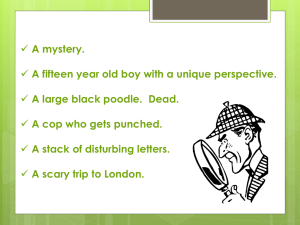
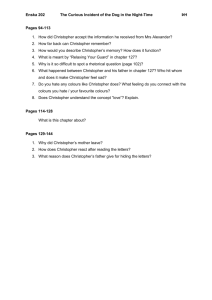
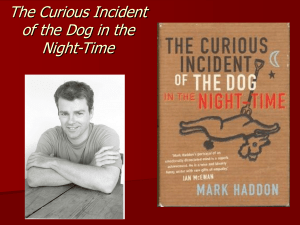
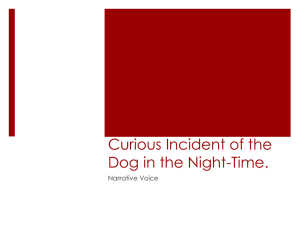
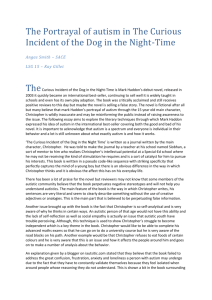
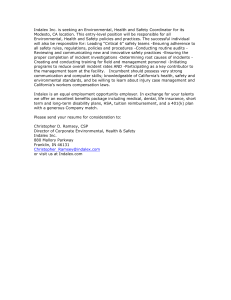
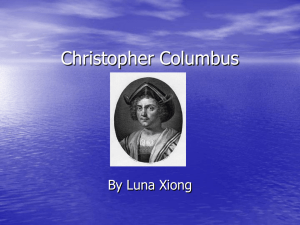
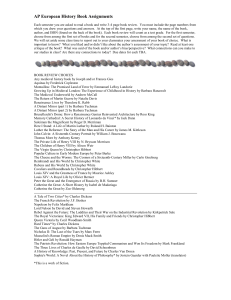
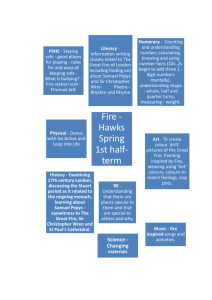
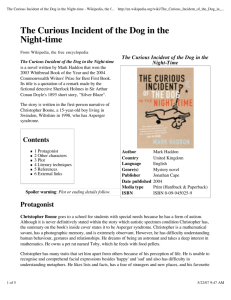
![Grade 9 Semester One Study Guide 2014[1]](http://s3.studylib.net/store/data/008941403_1-33da84e556d0c1ce3c84428ba7ba588f-300x300.png)
